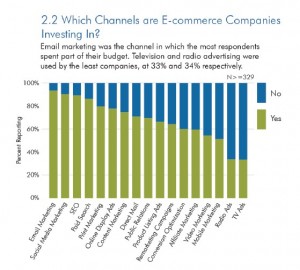Email continues to be an effective way to reach your customers and delight them with great content. But how do you toe the line between being spammy and providing information your potential customers want?

Email: It’s a great way to communicate with others, send documents or pictures, or get timely news and event notifications right to your inbox.
It’s also an unbelievably powerful tool for marketers.
When used correctly, you can use email to easily prove your worth, and follow up on leads like no other.
How do you provide value through email and gain customers? Let us walk you through it.
Why email?
Email is great for following up on leads because it’s so easy to track interactions and results. We can measure things like open rates ad click through rates, and we can look at the path a user takes when they navigate to our website. But it is also optimized to show users what we have to offer them.
The important thing to remember with email is keeping users active and subscribed. If you can understand what may drive users to open and explore emails, and what you can provide to them to keep their interest, the better your efforts will pay off.
What do you have to prove?
Think about a few different things when considering an email campaign. (Your buyer persona can come in handy here, too).
The first thing is: what do you most want to show your customers and potential customers? Do you want to emphasize your company and its culture? Do you want to display products that you sell? Do you want to provide news and announcements? Or do you want to be informative and educational?
You can potentially create email campaigns for each of these strategies for email marketing, but when you’re just starting out, it’s important to be streamlined and simple.
It’s easy to be overzealous, but users are extremely sensitive to spam.
Starting out with one purpose at a time can also help you rate the efficacy of your campaigns more effectively, when you test and compare them to each other individually. Running multiple campaigns at the same time can make it more difficult to identify specific successes and failures.
A/B testing is also an absolutely smart way to find the best campaigns for your customers. By comparing changes in keywords, subject lines, email copy, subject, and content, you can see what it is users are really responding to.
When you use email marketing wisely, you can prove your worth to potential customers in a number or different ways.
Prove: The quality of your company and/or your values
Take a look at your buyer persona(s).
Is your ideal customer someone who values saving time or saving money? Do they value trust and honesty, transparency, credibility, luxury, or something similar? Capture their attention and prove to them that your company exemplifies specific qualities that they value.
The social media tool Buffer says that one of the aspects of their company and culture that they value the highest is transparency. So they’ve put their money where their mouth is and have released their numbers on salary, spending, and performance.
Take a page from their book. It doesn’t necessarily have to be about transparency, but you can easily create email marketing campaigns that demonstrate how your company and values are aligned. In doing so, you are making your brand more appealing to those with the same values.
Prove: Your products/services are the best/most appealing.
E-commerce companies are well served to create email marketing campaigns that show their actual products—this is so potential customers can actual click on the products and learn more about them. It’s a fantastic way to shorten the path to purchase.
Utilize analytics that monitor which products seem to be most popular, and use that knowledge to create emails containing those desirable products (or ones similar). You can even get more personal and use data to retarget customers who have already looked at certain products, or who have searched for certain keywords.
Measure the click-through-rates for specific products within the email campaigns. If some are underperforming, switch them out with other products to optimize the CTR.
If your company doesn’t sell products, but offers services instead, you still can utilize this type of email marketing campaign.
Think about the problems your customers have that need solving. How can your company’s services solve those problems?
Create email campaigns that show specific services and all of the benefits that come along with them, or include CTAs over a wide range of services so users can simply select the one that appeals to them.
Users may be aware of your company or business, but they might not know the full scope of what you have to offer. Email marketing campaigns are a great way to show and tell.
Prove: You’re a go-to source
Newsletter sign-ups are a great lead generation tool. It’s an easy form users fill out, and it gives you valuable information. The only catch is that users will expect something in return for their information.
Another thing to consider is that someone who has signed up for an email newsletter probably knows who you are and what you’re about. There’s not necessarily a need to hard sell your products or services to them. What they’re probably looking for is more information about company or industry news, trends, or announcements.
Prove to users that you are a go-to source for this type of information. Newsletters that only talk about what you sell or tout your company may get you more unsubscribes than you’d like.
Providing useful information, offering discounts, exclusive sneak-peaks at products or industry-insider information will help you establish trust and authority with your email list.
The key is to make customers and potential customers feel that what you send them via email can be useful to them. And by creating an email campaign that displays that you can be a source of news and information, you’re increasing your credibility – a quality many consumers value highly.
Prove: You know what you’re talking about
Similarly, you can use email marketing campaigns to show what you know.
A lot of consumers invest in products and services with companies who they feel are experts in their industry. You can utilize the newsletter template, or create email announcements that show how you are benefitting other customers, or are at least knowledgeable in your field.
Consumer trust depends heavily on feeling like a company can walk the walk: you don’t just say you know something, you show you know something.
There are different methodologies to this, but for starters, consider curating content for your newsletter from other reputable sources. This can also help build your credibility.
Another truly successful use for email marketing campaigns is offering deeper level content such as e-books, white papers, or webinars. By making this type of content accessible to users through email, you can generate a higher number of views and higher likelihood of actual engagement.
Prove: You appreciate your customers
It’s all well and good if you’re an expert in your field, but if you don’t have great customer relationship skills or customer service procedures in place, you’ve got a long way to go towards gaining repeat customers.
Prove that you value your customers with email campaigns directed towards those who have already made purchases from you. Retarget customers with items they have previously viewed, or offer to put them in touch with a representative for a free consultation on their business needs.
- Try an email survey campaign. Find out what customers liked or didn’t like about doing business with you. This gives you valuable information on how to approach customer relationships in the future. Chances are, those who receive and respond to the survey will respect and appreciate you for taking the time to find out what they really think.
- Offer deals or discounts for repeat business or purchases. Use an email campaign to offer referral incentives or loyalty rewards. Lifelong customers are a huge asset to any business. It’s important to remember them when creating marketing campaigns, and email is an easy way to keep in touch.
Email campaigns are an important and useful tool for marketers for a number of reasons. One of the greatest reasons is that it gives you a versatile platform to provide value to your customers and potential customers.
Email marketing allows you full control of the content you disperse, while also providing easy ways to track metrics and quantify your efforts. This will help you duplicate great ideas and discontinue less impressive ones.
At the end of the day email marketing remains a great way to reach your customers; you just have to figure out what you want to say.
Digital & Social Articles on Business 2 Community
(47)
Report Post






